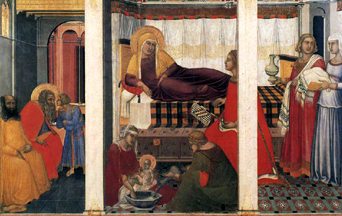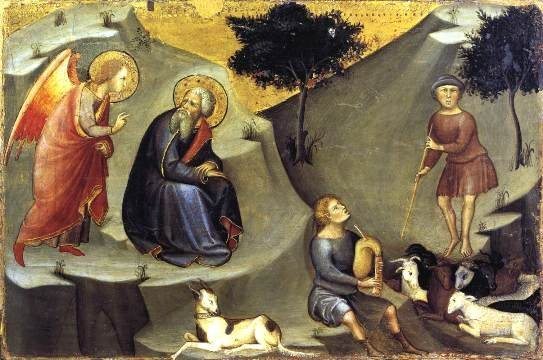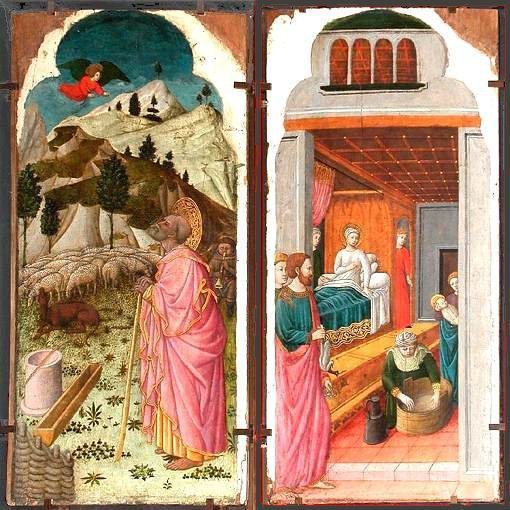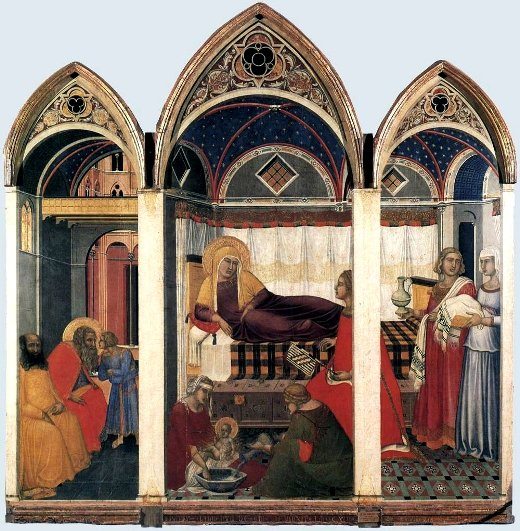
Many days passed before God finally completed the masterpiece of His creation. For nine months, the soul of Mary had given form to her virginal body, and the hour of her happy birth approached. As the suffocating Palestinian summer neared its end, the mellowing sun poured abundant torrents of golden light on the opulent plain of Samaria, ripening the rich orchards of autumn fruit. On a magnificent September day, with nature adorned in radiant beauty, the most Holy Virgin came into the world in the white-walled city of Nazareth.
She was probably born in the same house where the great mystery of the Incarnation later took place and where Jesus spent most of His childhood and youth in work and prayer. The angels did not acclaim the coming of the glorious Queen with hymns of joy as they later did the birth of the Savior. Invisible to the eyes of mortal men, the angels considered it an honor to mount guard around the humble crib over which Saints Joachim and Anne lovingly watched. The prophecy of Isaias had come to pass. The root of Jesse, ten centuries removed, had sprouted a new branch. On this same branch in but a few years more would blossom the eternal Flower, the Incarnate Word.
Her divine Son would soon appear representing a new dawn of hope upon a world plunged for four thousand years into the darkness of pain and death.
 Learn All About the Prophecies of Our Lady of Good Success About Our Times
Learn All About the Prophecies of Our Lady of Good Success About Our Times
The day the Queen of Heaven was born ranks as one of the most beautiful in history since it announced to condemned mankind the long-awaited time of liberation. In commemorating this great event, the Church bursts forth in its enthusiasm: “Thy nativity, O Virgin Mother of God,” sings the Church in its liturgy, “has announced joy to the whole world” — Nativitas tua, Dei Genitrix Virgo, gaudium annuntiavit universo mundo.
Indeed, we seem to forget in what horrible distress the world lay prostrate before the coming of Christ.
The sin of our first parents had borne the fruit of death. Until the coming of the Savior, the curse of the Almighty lay heavily upon sinful humanity. Adam had eaten of the forbidden fruit in the wild hope of becoming like God. With terrible irony, God stripped him of his magnificent privileges and reduced him to extreme misery. Thus, the ancient world was founded upon oppression of the weak and disregard for human dignity. The greater part of mankind was subject to the torments of slavery. Even Rome, the proud bearer of civilization, considered the multitude of its slaves as but an immense herd destined for slaughter. Indeed, masters had the power to send their slaves to their deaths solely to amuse themselves. The refined patricians of the Imperial City would sometimes use these poor souls as fodder for the salt-water eels they raised. Nothing satisfied their gluttony more than these delicious marine eels, fattened on human blood.
A Century Before Fatima, Providence Announced a Chastisement

The distress of souls was even more acute. Adam had supposed that he could do without God. He unappreciatively spurned his Sovereign Benefactor. God, in return, withdrew from His creature. He did not abandon mankind altogether, however, but spoke to him at rare intervals, announcing the future coming of a virgin who would crush the head of the serpent under her immaculate heel. He raised up prophets from among the people, yet He hid Himself within His inaccessible light.
Moreover, the Lord had not allowed the source of grace to cease entirely. He did not refuse His pardon to the repentant sinner, granting it under the sole condition of a perfect contrition. Even so, amid the temptations of the flesh and deprived of the abundant spiritual help now available to us, the weakest souls fell by the thousands into the infernal pit.
Poor men of ancient times! They keenly sensed their weakness and vulnerability, and they searched in intense anguish for some way to gain supernatural assistance in their necessity. God, a spiritual Being, escapes man’s rude senses, so men made idols in which to place their utmost hope. Alas, these statues were deaf and did not hear the heartrending cries arising from forty centuries of distress.
Devotion to the Heart of Mary Will Save the World
Yet, this terrible nightmare wherein mankind struggles dissipates like a dense nocturnal fog before the sweet morning light. The quadrant of eternity marks the hour of its infinite mercy. The birth of Mary begins the work of Redemption. In her crib, the mother of the Savior illuminates the desolate earth with the grace of her first smiles. Jesus will soon appear and, with His Precious Blood, will erase the sentence of our condemnation. The world which has suffered so, will finally delight in the joy of liberty and peace. Slavery will everywhere be abolished, and human dignity will henceforth be respected. Like a flowing stream, graces will spring forth in abundance from the sacraments. We have but to approach and draw from them — without limit — pardon, courage, and life everlasting.
The God who hid in Paradise will descend to earth and never abandon mankind. After His Ascension, Our Lord will remain among us under the Eucharistic veil until the end of time, when the Real Presence will leave the destroyed tabernacles. Christ will then visibly reign over the glorious souls of the resurrected elect. Such are the great joys the birth of Mary announces. “Thy nativity, O Virgin Mother of God has announced joy to the whole world.”

Our Lady’s Birth and the Triumph of Her Reign
The birth of the Blessed Virgin was, then, one of the foremost events of history. Let us now examine how the birth was received and draw lessons from this meditation that will benefit our interior lives. The holy Fathers of the Church express the impact of the birth of the Immaculate Virgin on the invisible world by describing the heavens overwhelmed with wondrous admiration. The angels were at a loss to find adequate praises for acclaiming the adorable Trinity for having created her who was the beloved Daughter of the Father, and who would become the Mother of the Word Incarnate and the Spouse of the Holy Ghost. Nor did they weary of admiring the beauties of their queen. The blessed spirits, who rejoice at the conversion of a single soul, rejoiced upon seeing the appearance of the sure Refuge of sinners. They knew that Mary would one day be the Gate of Heaven who would never refuse entry into the eternal kingdom to those who invoked her with confidence. The Fathers also note the immense sigh of relief of the just in limbo, those who had died since the beginnings of the world, as well as the furor of the demons in Hell, who saw the approaching end of their tyrannical reign.
Hail, Mother of Hope
How was the birth of Mary, which delighted heaven and terrified the fallen angels, received on earth? The birth of Saint John the Baptist several years later was accompanied by miracles that vividly impressed the popular imagination. The inhabitants of Judea asked themselves with admiration: “What will become of this child whose arrival in this world is hailed by so many prodigies? What, then, will this child be?” The sublime mission of Mary far surpassed that of the Precursor. Yet, nothing extraordinary indicated to the multitudes that she who was promised to sinful man immediately after the fall and whom the prophets had announced throughout the centuries was born. In fact, the Immaculate Virgin was born amid universal indifference.
According to certain traditions, no one in the small town of Nazareth where Saints Joachim and Anne lived paid heed to the new arrival. Although the blood of David flowed in her veins, her family had fallen from its ancient splendor. Who noticed these impoverished people?
Anne and Joachim had been childless for many years, but the Lord had at last answered their prayers. They saw their daughter Mary as the measure of His celestial goodness to them. Little did they suspect, however, the veritable treasures the Most High had instilled in the soul of their child. They could not have imagined the wonder of her Immaculate Conception. They did not realize that the Mother of the Redeemer lay in their loving arms.
The Jews of the time were plunged in discouragement. The voice of the prophets had not been heard for years. Having lost their political freedom, they believed Providence had abandoned them. It was then that the hidden work of infinite Mercy began to be accomplished in their midst.
Our Lady of Confidence

These facts speak for themselves and teach us an obvious lesson. Would that the obscurity of Our Lady’s birth teaches us to make little of human greatness! Let us keep a Christian perspective of indifference toward the fleeting vanities that Christ Himself shunned in His Mother’s birth. Were these important, surely He would not have refused them to His mother.
This great mystery also teaches us never to lose heart. The Immaculate Mother came into the world at a time when the Jews had lost hope. Indeed, they thought all was lost. Let us reap the benefit of this lesson. We often become discouraged when, calling on heaven to assist us, our request is not immediately granted. Sometimes God waits until we are on the brink of the abyss before extending His hand of mercy. So, let us not become discouraged and cease praying! The Almighty will intervene at the very moment when we believe ourselves completely abandoned. If we have confidence — an unlimited supply of confidence — we will be greatly rewarded!
Saint Thomas of Villanova explained in a sermon that Mary is the heavenly dawn, not only for the world, but especially for each individual soul. He recalled the great truth taught by Catholic tradition that a soul imbued with devotion to the Blessed Virgin carries within it the sign of predestination. Do you firmly desire to be saved from final damnation? Then faithfully honor Mary. Do you wish to guarantee the salvation of those who are dear to you? Obtain from them the promise that they not fail to recite some prayer to Mary every day. Catholic Tradition states that a servant of Our Lady cannot perish: Servus Mariae non peribit. He will forever sing the mercy of Jesus and of His holy Mother.
